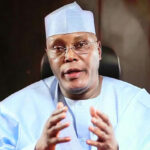The National Bureau of Statistics (NBS) revealed in its Expenditure and Income Gross Domestic Product (GDP) report that Nigerians spent N61.07 trillion on household consumption in the first half of 2023.
This figure represents a 2.83% increase compared to the same period in 2022, amid persistent double-digit inflation, which has continued to challenge the country’s economic landscape.
Join our WhatsApp ChannelSpeaking on the findings, the NBS highlighted that household consumption remained a dominant component of GDP expenditure. The report underlined that this spending includes imputed expenditure by resident households on various consumption goods and services.
READ ALSO: Petrol Hits N630.63/Litre, Diesel N1004.98/Litre In October- NBS
The report’s insights shed light on the nuances of household expenditure in the first two quarters of 2023.
Notably, there was a growth of -24.95% and 3.30% in real terms year-on-year for Q1 and Q2 of 2023, respectively. These rates were lower than those recorded in Q1 of 2022 but higher than Q2 of 2022.
Household consumption represented 57.18% and 64.05% of the real Gross Domestic Product in Q1 and Q2 of 2023, respectively, compared to figures of 78.02% and 63.65% in the corresponding quarters of 2022.
The report attributed the fluctuations in consumption patterns to the impacts of the pandemic, cash crunches, rising prices, and challenging economic conditions.
It noted a positive growth rate of 3.30% in Q2 of 2023, a departure from the negative trend of the previous quarter.
However, the report also highlighted concerning economic indicators. With inflation reaching a staggering 27.33% in October 2023 – an 18-year high – Nigerians have faced increased expenses for essential items.
The rising cost of food, housing, utilities, and clothing has been driving inflation figures upwards, contributing to the strain on household budgets.
Analysts anticipate continued economic instability in 2024 due to the persistence of double-digit inflation. The Central Bank of Nigeria (CBN) has cautioned about the likelihood of ongoing inflationary pressures in the near future.
In light of these findings, it’s evident that despite economic challenges, Nigerians continue to navigate increased spending, indicating resilience amid an economically challenging environment characterized by persistent inflationary pressures.
Emmanuel Ochayi is a journalist. He is a graduate of the University of Lagos, School of first choice and the nations pride. Emmanuel is keen on exploring writing angles in different areas, including Business, climate change, politics, Education, and others.
- Emmanuel Ochayihttps://www.primebusiness.africa/author/ochayi/
- Emmanuel Ochayihttps://www.primebusiness.africa/author/ochayi/
- Emmanuel Ochayihttps://www.primebusiness.africa/author/ochayi/
- Emmanuel Ochayihttps://www.primebusiness.africa/author/ochayi/



















Follow Us